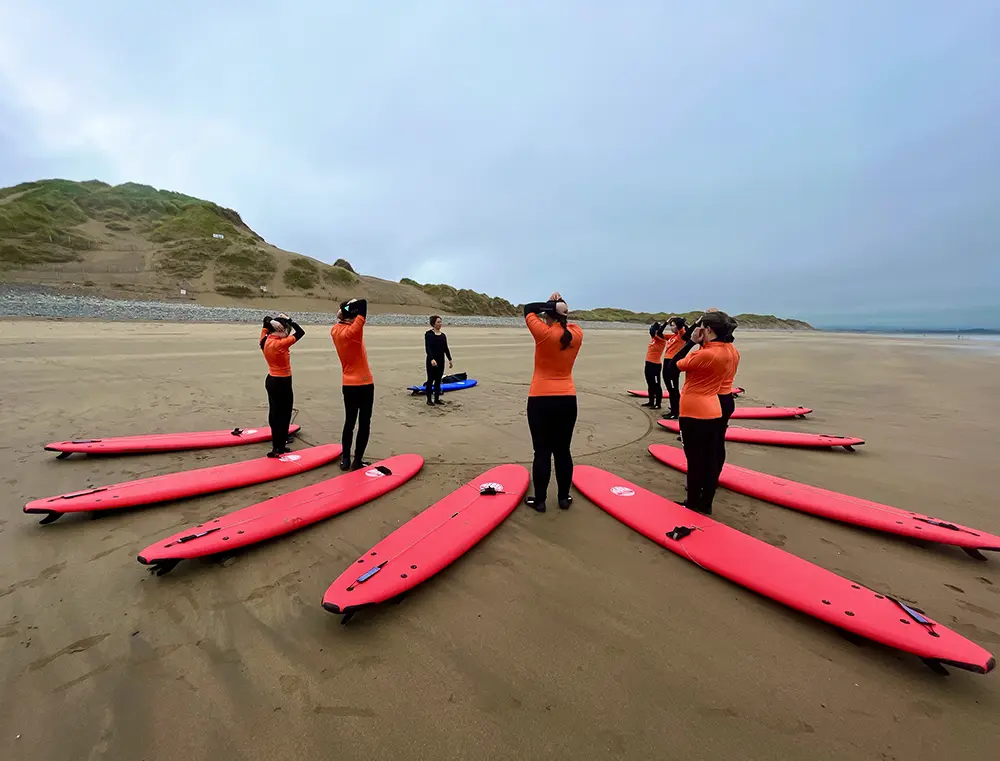
Blogs
Surfing and Mental Health: The Science of Ocean Therapy and Emotional Resilience

You’ve tried walks, podcasts, and deep breaths at your desk. But the stress keeps creeping back.
Maybe it’s time for a change: the cool rush of saltwater, the steady pull of a wave beneath your feet, and the world narrowing to just this moment. Your body feels like it’s one with the board and the ocean. We’re not talking about a spa day or a gym fix. It’s more fun than that!
This article dives into the science-backed connection between surfing and mental health, with insights from large-scale studies in Australia and the UK. You’ll learn what the research says about blue spaces, see real statistics on well-being, and explore how surfing supports stress relief, mood, focus, and social connection.
We’ll also show you how Atlantic Surf School creates safe, joyful experiences that support emotional well-being at every level.
Ready to feel it for yourself? Let’s begin.
The Science Behind Surfing’s Mental Health Benefits
Over the last decade, researchers have turned their attention to the healing power of blue spaces: environments centred around water such as oceans, rivers, and lakes. These spaces are now recognised for their distinct and often profound impact on human well-being.
While the benefits of green spaces (such as forests and parks) have been widely documented, recent studies show that blue spaces provide unique therapeutic effects. Surfing, in particular, offers a powerful blend of both: the saltwater, sound of waves, and expansive sky, along with the coastal greenery that often frames a surf spot.
Surfing as an Ocean-Based Ecosystem Service
We used two major studies, one conducted in Australia and another from the UK Surfing and Health Survey, to offer you credible, data-backed insights into the way surfing impacts mental well-being. Both relied on large participant samples and validated self-report tools such as the Personal well-being Index, making their findings strong indicators of real-world impact.
Here is what the numbers have to say:
- Australian surfers reported 2.3% higher overall well-being than the national average.
- Over 75% said surfing helps them manage stress, boost mood, and build social connections.
- In the UK, participants described feelings of revitalisation, clarity, and reduced anxiety after surfing.
- Surfing frequency was linked to better-reported physical and mental health.
- Participants reported moderate physical exhaustion but low anxiety levels after sessions.
- Main motivations included fun, performance improvement, and mental well-being support.
This research reinforces what surfers already know: time in the water lifts you, physically, emotionally, and socially. In a less recent study, marine biologist Dr. Wallace J. Nichols even coined the term Blue Mind Theory to describe the calm, focused state people enter when they are near or in water!
But what makes surfing so powerful?
The Unique Benefits of Surfing on Mental Health
This rare mix of physical-mental connection and sensory immersion is all grounded in the natural environment. Together, these elements create powerful mental health outcomes that go far beyond a simple workout.
Exposure to Water
Simply being in or near the ocean can reduce stress. The sound of waves, the salt in the air, and the visual openness of the sea are linked to lower cortisol levels, improved emotional regulation, and even pain relief, making surfing mental health a natural fit.
Physical Exertion With Purpose
Surfing is a full-body challenge. Paddling builds strength and endurance. Balancing on the board sharpens focus and control. This kind of dynamic movement improves mood, sleep, and stress tolerance, and is a key reason why the mental benefits of surfing are so widely reported.
The Flow State
To catch a wave, you need total presence. No distractions. No overthinking. This focused state, often called “flow,” is associated with increased happiness, reduced anxiety, and a deep sense of clarity. It is mindfulness in motion, and it is central to surfing therapy.
Positive Social Interactions
Even though surfing is often seen as a solo sport, it strongly relies on community support. Somebody has to cheer you on as you fall from the board for the 50th time, and get back up before riding your first wave! From building up each other’s emotional resilience to sharing post-session stories, surfing naturally fosters connection.
Nature-Based Healing
Surfers engage with living ecosystems. This exposure to blue and green environments is shown to improve attention, reduce mental fatigue, and strengthen resilience. It is part of what makes surfing for mental health such a compelling match for those seeking real, lasting well-being.
Whether used as a structured intervention or simply as a hobby, surfing creates conditions that support emotional balance, presence, and connection: core ingredients of psychological health.
Surfing As Both Therapy and Recreation
Programs in Australia have already shown success using surfing as a therapeutic intervention for youth facing anxiety, depression, and attention challenges. The benefits have also been documented among adults recovering from addiction and managing chronic conditions such as cystic fibrosis. Even volunteers and instructors in surf therapy settings report improved mood and resilience.
Still, it’s important to remember that research is still evolving, and more rigorous trials are needed to fully understand surfing and depression, as well as the activity’s clinical impact Still, the growing global interest in surf therapy speaks volumes about its promise.
Who Benefits Most from Surfing Therapy?
Surfing’s mental health benefits are broad, but some groups tend to experience especially strong results, both in structured programs and casual lessons.
Kids navigating emotional or behavioural challenges
Surfing builds confidence, self-regulation, and resilience in a non-clinical, fun environment. That is exactly what Beats and Waves Youth Camps are designed to support.
Adults managing stress, burnout, or simply a lousy mood
The rhythm of the ocean, physical exertion, and moment-to-moment focus offer an antidote to overwhelm. Adult Surf Camps combine skill-building with emotional reset.
Seniors seeking low-impact, high-reward movement
Surfing improves balance, posture, and mood: all in a supportive, non-competitive setting that respects different paces and needs.
Anyone feeling disconnected or mentally fatigued
Surfing offers a return to the present moment. It grounds you in nature, body, and breath, helping you feel more alive, more focused, and more at ease.
Surfing Lessons Designed With Care
Every lesson is built around encouragement, presence, and trust. Whether you're catching your very first wave or returning after a tough season, the team meets you with warmth, patience, and genuine connection.
The instructors bring international experience, deep care for mental well-being, and a gift for helping people feel both safe and inspired. You are not just learning a sport. You are stepping into a mindful, joy-filled experience that can shift your whole outlook.
Explore our surf lessons to see how they support surfers of all backgrounds and abilities, or learn more about the school’s heart and values on the About Us
Ready to Feel the Difference?
From stress-reduction to increased joy, from clearer focus to deeper connection, the benefits of surfing run far deeper than the water itself. The research is in, the stories are real, and the link between surfing and mental health is stronger than ever.
If you are ready to try something that truly restores and uplifts, this is your moment.
Book your surf lesson with Atlantic Surf School and start your path to better balance, well-being, and peace of mind.
You Might Also Enjoy These Related Articles